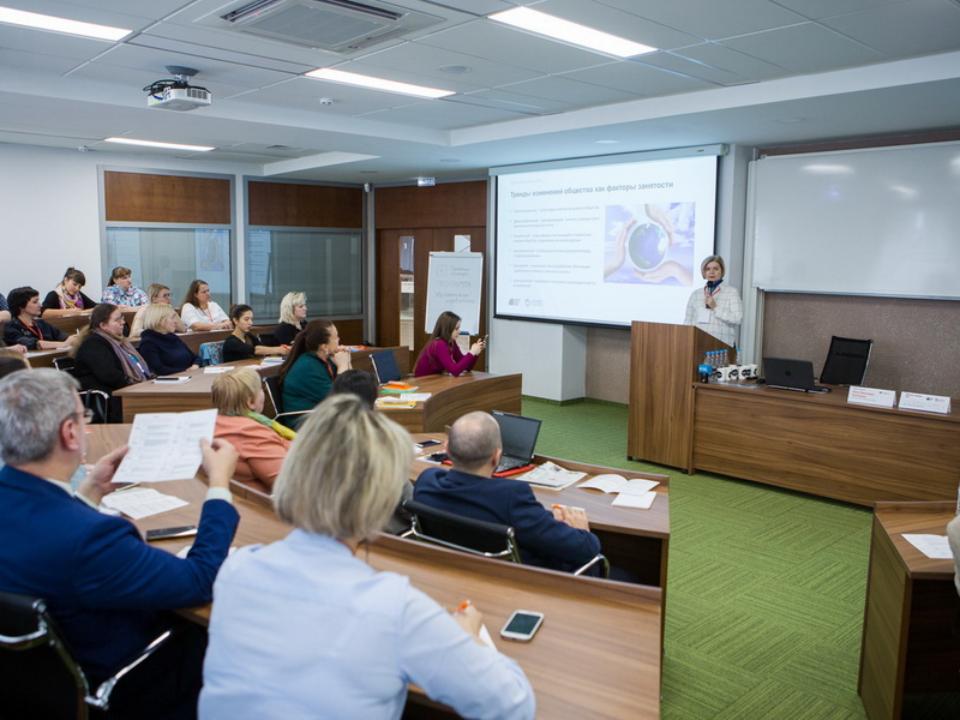Two months have passed since TSU joined the Employment Promotion federal project as part of the Demography national project. Our university has become one of the three main operators of the project. But why is a classical university suddenly concerned with unemployment still requires a popular answer? Today, I will give a detailed explanation.
Indeed, this project, which runs until 2024, is not limited to vocational training and retraining of job seekers, for whom it offers a huge number of free training programs. It is aimed directly at integrating them into labor processes in other professional areas. At first glance, such a target goes beyond the responsibility of a university that is primarily engaged in higher professional education and scientific research.

Let's try to look at the problem of employment in a broader and deeper way. The standard reasons for unemployment are the lack of jobs, the lack of the necessary skills among employers, the phenomenon of so-called professional unemployment, and shadow employment. However, special studies carried out in the last few years by TSU researchers and the Tomsk Region Department of Labor and Employment show that there are other reasons. Those reasons are anthropological, purely because of the individuals. There are six of them: 
The first reason is a frozen state of a person as a lack of vital energy and also a lack of desire to start a real job search. It starts with a sober assessment of the situation and self-evaluation. If the total number of the unemployed is conventionally taken as a hundred percent, then there are about fifteen percent of those who are stuck in this state. Obviously, the Employment Promotion project will not be able to help them immediately, since it is initially focused on people with a proactive approach to life, able to assess their capabilities and knowledge deficits in order to consciously choose the vector of their professional development. For those who are suspended, it is not the programs of additional professional training that are needed, but trainings of personal actualization under the guidance of qualified specialists. And only after that will the professional training programs be useful to them.
The second reason is the lack of an answer to the question: How to start? There are people who want to work, but have no idea about the structure of the labor market, about the most popular professions and labor areas in their cities and regions, as well as about potential employers who offer vacancies and the like. Among them, there are many recent university graduates who have no professional experience. There are young mothers who have been on parental leave for a long time, citizens of pre-retirement age, as well as those who want to change their jobs because they see no perspectives. It is clear that this section of the unemployed and job seekers need help that is more of an informational nature. 
The third reason is the inability to “place a bet”. In this situation, unlike the previous one, people are well informed or even too well informed about what is happening in the labor market. But it is precisely the large number of potential opportunities and their own interests in various types of activity that prevents them from making the right choice. In other words, there is information, but there is no understanding of what is most suitable. And even having chosen a field of professional activity that is fitting, a person can have difficulties identifying a niche - specific work that they would like to do. Sometimes people do not see the difference between the general professional sphere and a specific profession. For example, it is known that some of the graduates of pedagogical majors do not want to work in schools and look for work in other non-educational areas. However, after appropriate training and field practices, they are surprised to realize that they would like to establish their own educational and creative centers to work with children, adolescents or adults. The main secret to success in this case is helping them see the opportunity map and combine their interests and abilities with it.

The fourth reason is the inability to critically assess one's strengths and weaknesses and, as a consequence, the inability to build effective strategies for self-presentation, that is, to adequately represent oneself in the labor market. In this case, programs are needed to form meta-competencies or soft skills. We are talking about communicative skills, which allow people to feel confident in a new environment, communicate with strangers, work in a team, and perform in front of an audience. It is no secret that many employers prefer applicants with meta-skills rather than only narrow professional competencies, since it is easier to teach a person who can listen and understand a mentor, work in a team. The second to fourth reasons together account for about thirty percent of all unemployed. 
The fifth reason is the lack of the necessary professional knowledge and skills to qualify for the most suitable job, despite the fact that people already know and understand everything about themselves and want to work in certain areas. This is the reason for about forty percent of people to be unemployed. In fact, the Employment Promotion federal project is aimed primarily at them. In this case, they need qualified help in choosing the right professional training programs, rather than trainings on personal actualization.
The sixth reason is dissatisfaction with the existing working conditions, and the desire to find an ideal job (a better position, a better organization, a more suitable corporate culture). There are only about fifteen percent who experience such dissatisfaction. As a rule, they are highly qualified to choose their place of work. But they also need help, otherwise their search may take a long time. This assistance should be provided not only by specialists from employment services, but also by employers themselves, participating in the professionalization process: conducting more detailed interviews with such people, showing them work places, and organizing trial internships.

It becomes clear that the listed anthropological reasons for unemployment also represent six stages of bringing unemployed people from the couch addiction to the choosing an ideal organization and a position, which suits them most. Of course, not all of them are able to go through all these stages, even with the help of specialists, because there are other reasons that complicate the professionalization processes. These are all factors that together make up that general socio-cultural context in which a person exists (their family, friends, neighbors, etc.) and which has a constant impact on them. Nevertheless, early professional support such as tutor support, motivational trainings, employer involvement and, of course, high quality continuing training programs has a strong impact on the employment processes.
Here I would like to go directly to the problem of the effectiveness of programs of additional professional training. It is believed that these training programs are effective if they meet the demands of the labor market in the first place. But who should clarify and formulate such requests? Is it possible to do this only by the efforts of the developers of training programs, who traditionally have the main responsibility for such compliance? And does not the very phrase “labor market demands” imply that both employers and state employment services as participants in this market should be actively involved in their development?

Despite the obvious answers to these questions, "labor market demands" often remain in the realm of abstractions. However, particular questions require particular answers. In our case, particular requests require particular training programs. Most often, they are developed by educational institutions and teaching teams in accordance with their ideas about the situation on the labor market. Ideally, they should be based on an accurate analysis and constant monitoring of employment in a particular city and region, carried out by the relevant government agencies. Employment indicators can change relatively quickly, which should also be reflected in the rate of replacement of less relevant training programs with more relevant ones, which are those that are most in demand in a given period of time. These can be either completely new programs or those that continually draw interest due to the socio-economic situation.
If we consider that the direct developers of professional training programs are, most often, teachers of certain disciplines, whose main task is the professional training of adults in a specific area, then we can assume that someone should prepare proper technical assignments for them. This “someone” is a specialist who is a mediator between employment services and employers, on the one hand, and teachers who develop training programs, on the other. This mediator must translate the "demands of the labor market" (monitoring the employment) into an "educational order" for the development of specific programs for vocational training or retraining. 
However, even this is not enough to completely solve the problem of the effectiveness of professional training and retraining programs, since the aforementioned anthropological factors must also be taken into account. According to this theory of professionalization, a person needs not only knowledge about a profession, but also knowledge about themselves. The stage of working with values and meanings is very important, otherwise one may not understand the real reason for unemployment or professional failure. In fact, a person may have problems with self, and not with employment. And then they need not only technological professional knowledge and skills, but skills to self-organize and self-develop.
Usually, employment involves embedding a potential employee in the work process. The Employment Promoting project goes one step ahead: it sets the task of making a potential employee more adequate to the labor process by offering them vocational training or retraining. We believe that the next step should be to see the person, rather than just a potential employee. A person is the whole range of personal characteristics, previous social and professional experience, life value and semantic attitudes. We need to develop programs that would put this person in a particular professional activity or organization in which they would like and could work.

If we start looking at the problem of employment from an anthropological point of view, it explains why universities must be involved. Only then can we see the task of providing human resources for certain sectors of the economy, and the task of developing human capital and potential in the region. At the same time, it is necessary to understand that the positive influence of anthropological factors on the labor market and the economy does not occur directly, but through the creation of an entire ecosystem. It should include not only key participants in the labor market, but also educational institutions that develop training programs for continuing education, as well as social services that provide assistance of a different nature: psychological, pedagogical, informational, educational, cultural, etc. The problem of forming human capital and potential, as well as creating effective models of employment, is a topical subject of research for universities. All of this was the reason for the initiative of the Minister of Science and Higher Education of the Russian Federation Valery Falkov to introduce universities in the implementation of the Employment Promotion project.
Eduard Galazhinskiy,
TSU Rector,
Acting President of the Russian Academy of Education
Translated by Snezhana Hosova
